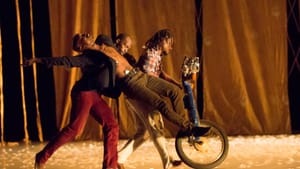Stay in the Loop
BSR publishes on a weekly schedule, with an email newsletter every Wednesday and Thursday morning. There’s no paywall, and subscribing is always free.
Witnessing and remembering
Baker & Tarpaga Dance Project presents 'Declassified Memory Fragment'

Olivier Tarpaga and his American wife, choreographer Esther Baker, lead the Baker & Tarpaga Dance Project, a company based partly here in Philly and partly in the landlocked West African nation of Burkina Faso. Their show, Declassified Memory Fragment, opened at the FringeArts building as an “Extended Fringe” production.
Working against the tides
You may know little of Burkina Faso other than the January 2016 Al-Qaeda attack on Hotel Splendid, which left 28 dead in Ouagadougou, its capital city. Sadly, the nation shares the violent history of too many colonized and uncolonized African countries, with multiple coup attempts and successes. The miracle is that artists still work against the violent tides of blood, witnessing, commemorating its victims and heroes, historicizing the paths that lead to bondage or freedom.
This piece threads back through Burkina Faso’s rich music and dance history. The company collaborates with the Dafra Kura Band, equipped with contemporary and ancient handmade instruments, and braids Tarpaga's contemporary choreography with the music. The result is a well-wrought performance piece that is anything but raucous and fulfills the most important criteria for a work of art: necessity.
It opens with the actual recorded sounds of Burkina Faso’s million-person 2014 uprising and mano-a-mano martial-arts-infused duets. But previous descriptions that imply an in-your-face angry attitude are not accurate. I found Declassified Memory Fragment often a gentle invitation to love, humanity, decency, and even laughter.
Motorcycles clog the streets of Ouagadougou and headlighted unicycles by Sahab Koanda feature in the work. The first vehicle holds three of the all-male cast, arms rippling out from collarbones to grasp some unseen desire or plea. Later, a dancer raises another lighted unicycle to shoulder height, training it on the audience as automatic weapon and spotlight.
Struggle for power
Of the dancers, including Ousséni Dabaré, Aziz Dermé, Jérôme Kaboré, and Tarpaga (who also left the stage to play on his djembe), the aptly named Adonis Nébié seems most essential. He struggles with the taller Tarpaga to wear the jacket of the powerful leader and wins it with sly subterfuge. After the two each poke an arm through opposite sleeves, leaving neither in charge, Nébié slips his other arm up through Tapaga’s sleeve and whips the jacket away. With his new power, he later performs bandy-legged cock o’ the walk dance phrases. Perhaps because he does them with his back to us, the walk is neither threatening nor bossy, but curiously endearing.
Esther Baker-Tarpaga acted as dramaturg and artistic advisor in this exceptionally smart work that ends with red leaves falling from the eaves. Are they the hearts of so many who die in conflicts, or their blood? In Taparga’s words, “Declassifying is a process of revealing, exposing what is hidden from view, obscured, unspoken."
Senegal may have its Compagnie Jant-Bi, but Burkina Faso now shares Baker & Tarpaga Dance Project with Philly, and what a gladdening addition they are for us.
What, When, Where
Declassified Memory Fragment. Conceived and choreographed by Olivier Tarpaga. Baker & Tarpaga Dance Project. Octover 13-14, 2017, at FringeArts, 140 N. Columbus Boulevard, Philadelphia. (215) 413-1318 or fringearts.com.
Sign up for our newsletter
All of the week's new articles, all in one place. Sign up for the free weekly BSR newsletters, and don't miss a conversation.

 Merilyn Jackson
Merilyn Jackson